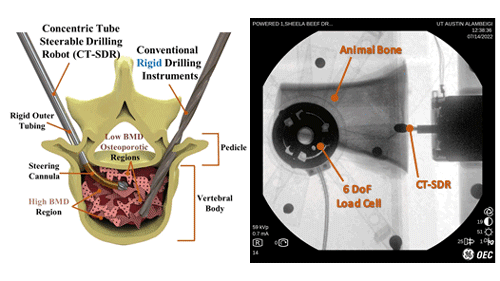Spinal fixation with rigid pedicle screws have shown to be an effective treatment for many patients. However, this surgical operation has been proved to be insufficient and will eventually fail for patients who are experiencing osteoporosis. This failure is mainly attributed to the lack of dexterity in the existing rigid drilling instruments and the complex anatomy of vertebrae, forcing surgeons to implant rigid pedicle screws within the osteoporotic regions of the anatomy. To address this problem, in this paper, we present the design, fabrication, and evaluation of a unique flexible yet structurally strong concentric tube steerable drilling robot (CT-SDR).
The CT-SDR is capable of drilling smooth and accurate curved trajectories through hard tissues without experiencing buckling and failure; thus enabling the use of novel flexible implants for the next generation of spinal fixation procedures. Particularly, by decoupling the control of bending and insertion degrees of freedom (DoF) of the CT-SDR, we present a robotic system that (i) is intuitive to steer as a clinician does not need to control the bending DoF and simply needs to insert the robot during the drilling procedure, and (ii) is flexible yet structurally strong to create a generic curved drilling trajectory within the hard tissue without failure.
The robust and repeatable performance of the proposed CT-SDR have been experimentally evaluated by conducting various drilling procedures on simulated bone materials and animal bone samples. Experimental results indicate a drilling time similar to the existing drilling procedures performed with rigid instruments and a remarkable steering accuracy with a maximum 2% deviation error.

